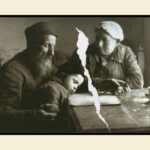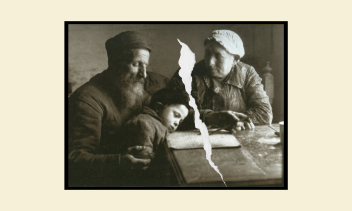My father is quite different religiously than his father was. Growing up in the 1950s in North Adams, MA, even those families that were Orthodox, as my grandparents were on paper, did not keep Shabbos. Most went to work. My father, through the efforts of NCSY, gradually adopted a more Orthodox lifestyle, much to the initial chagrin of my Zaide. He began wearing a yarmulke at home—my Zaide would beg him to “give your head a rest.” My uncle, a more free, more naturally spiritual person—as opposed to my father’s rule-following personality—never made the changes my father made. Instead, he was affiliated with a Reconstructionist congregation. For many years, in different ways, religious affiliation was not a source of cohesiveness, but a source of division. I’ve come to learn this experience is more common than many would like to admit. Not every family experiences drastic generational changes in religious affiliation or observance, but nearly every family has seen some subtle shifts in trajectory that can nonetheless become sources of tension. A lot of that has to do with the nature of religious identity in general. Our religious identity is rightfully seen as the summation of our values, so when one generation expresses them differently, it can feel like misusing a family heirloom. It’s hard not to take it personally when a necklace that’s been in your family for ages is suddenly used in ways its original owner never considered.
Parents have a lot of different ways of coping with such changes. One word that is often whispered, but less frequently spoken, is disappointment. There are few things that sting like a parent’s disappointment. For many years, I would avoid even sharing details about my life with my parents since any update would be subject to the mercy of a stray negative glance or muted sense of concern that parents so often try to disguise but children so often register. And I have great parents. I haven’t taken a formal poll, but I think I might have the best parents. They raised a family of five, each of us with our own identity quirks and religious idiosyncrasies—they know which of their kids to buy cholov Yisroel for and which of their children just want the Wi-Fi password. But like any family and raising any children, especially with religious expectations, it was not always easy. My father is the Cal Ripken Jr. of going to minyan—my brother and I were not. My mother seems to always be instinctively whispering Tehillim—not all of us had such a religious constitution. And when parents have a certain set of expectations, especially with values they hold so dear, disappointment can emerge.
… if there were ever something worth stretching ourselves for, it’s family.
In my first Hebrew essay that I later wrote in English for Jewish Action, entitled “Rabbi’s Son Syndrome: Religious Struggle in a World of Religious Ideals,” that was later included in my book, Sin·a·gogue: Sin and Failure in Jewish Thought, I explored this dilemma regarding children of rabbis (for now, let’s just let it pass without comment that I clearly have a problem when it comes to recycling my own material). Few professions have such a public facing identity, but in truth this is an issue all families face. How do religious expectations, or any parental expectations for that matter, not metastasize into disappointment when they are not met?
In the essay, I explain why Birchas Kohanim, the Priestly Blessing, was canonized in the siddur as the essential text of Torah we make the Blessing of the Torah on each morning:
…Priestly Blessing follows the Blessing on the Torah. As we begin each day recognizing the centrality of our obligation to pursue our attainment of Torah, we pause to acknowledge the possible dangers inherent within a singular focus on Torah study. The ideals of Torah study cannot be achieved at the expense of the appreciation of the people. Our study of Torah, like Birkat Kohanim, should leave those in our lives feeling more beloved and more blessed. The Priestly Blessing and the Blessing on the Torah preceding it dually ensure that our Torah study is not just the fulfillment of a commandment, but an endeavor that is sweet for all those around us. Sweet for us and for our children.
“For the rabbi’s child,” concludes Dr. Levitz, “self-esteem is enhanced with the experience of feeling valued as an integral part of the family group in its designated work with the congregation.” It is a sad fact of religious life that our personal growth can often come at the expense of others’ self-worth and self-esteem. The Torah and Talmud were both acutely aware of this danger. The ideals and expectations of religious life can be divisive wedges within families and communities. Each morning, when saying the Blessing on the Torah followed by the Priestly Blessing, we pause and tacitly acknowledge that concern. But if our blessings are successful, we can rest assured that our religious commitments remain “sweet in our mouths and in the mouths of Your people.”
This negotiation between our religious expectations and ideals, as well as our familial connections, is something that has long had a close place to my heart. I was a guest on a popular podcast this past year and they asked me what is my favorite mitzvah. I answered Birchas Kohanim, the Priestly Blessing. And I am not a Kohen. But to me this prayer is still a personal plea that our religious commitments should only translate into feelings of blessings for others. That is not always easy, especially within a family. But if there were ever something worth stretching ourselves for, it’s family.








